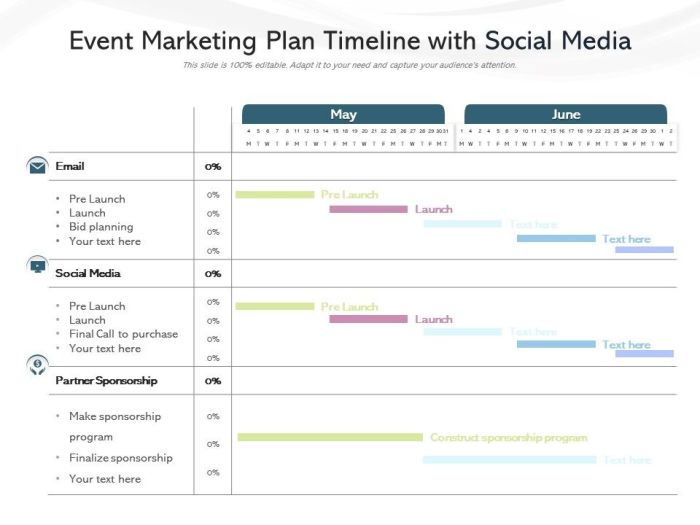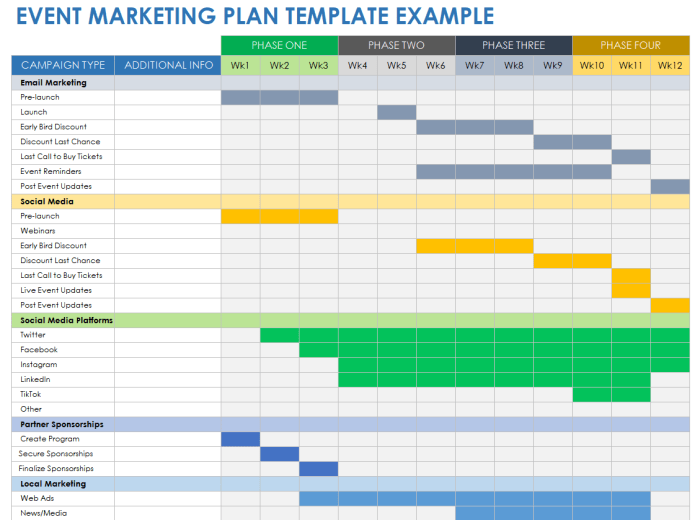Developing an Event Marketing Plan sets the stage for this enthralling narrative, offering readers a glimpse into a story that is rich in detail with american high school hip style and brimming with originality from the outset.
When it comes to crafting a successful event, having a solid marketing plan is key. This plan not only Artikels how to promote the event effectively but also ensures that objectives are met and resources are optimized to achieve the desired results.
Overview of Event Marketing Plan
An event marketing plan is a strategic document outlining the promotional efforts and tactics to be employed in order to attract attendees and create buzz around a specific event. It is crucial in ensuring that the event reaches its target audience and achieves its objectives effectively.
Event marketing plans differ from general marketing plans in that they are tailored specifically for a particular event, taking into consideration its unique characteristics, target audience, and goals. While general marketing plans may focus on overall brand promotion, event marketing plans are more focused and time-bound.
Key Components of an Event Marketing Plan
- Identifying the target audience: Understanding who the event is aimed at and tailoring marketing efforts to reach this specific group.
- Setting clear objectives: Defining what the event hopes to achieve in terms of attendance, engagement, and ROI.
- Choosing the right marketing channels: Selecting the most effective platforms to promote the event, such as social media, email marketing, or traditional advertising.
- Creating a timeline: Mapping out a schedule of marketing activities leading up to the event to ensure a cohesive and strategic approach.
- Budgeting: Allocating resources effectively to maximize the impact of marketing efforts while staying within financial constraints.
- Evaluating results: Monitoring the success of the event marketing plan through metrics like ticket sales, website traffic, and social media engagement to make adjustments for future events.
Setting Objectives and Goals

Setting clear objectives and goals for an event marketing plan is crucial for ensuring the success of the event. Objectives provide a clear direction for the marketing efforts, while goals help in measuring the effectiveness of those efforts. They serve as a roadmap to guide the marketing team towards achieving the desired outcomes and maximizing the impact of the event.
Significance of Setting Objectives and Goals
Setting clear objectives and goals helps in aligning the marketing activities with the overall purpose of the event. It allows the team to focus their efforts on specific outcomes, whether it’s increasing brand awareness, driving ticket sales, or generating leads. By defining objectives and goals, the team can measure the success of the event marketing plan and make necessary adjustments along the way to ensure its effectiveness.
Examples of Objectives and Goals
- Objective: Increase brand awareness
- Goal: Achieve a 20% increase in social media followers
- Objective: Drive ticket sales
- Goal: Sell out 90% of available tickets
- Objective: Generate leads
- Goal: Collect 500 new leads at the event
Ensuring Objectives and Goals are Measurable and Achievable
It is essential to ensure that objectives and goals are measurable and achievable to track progress and evaluate success. To make objectives and goals measurable, they should be specific, quantifiable, and have a defined timeline for completion. This allows the team to track their progress and make adjustments as needed. Additionally, objectives and goals should be realistic and achievable within the resources and constraints of the event marketing plan to set the team up for success.
Target Audience Analysis
Understanding your target audience is crucial in developing a successful event marketing plan. By conducting a thorough analysis, you can tailor your strategies to effectively reach and engage with your desired attendees.
Importance of Target Audience Analysis
- Demographics: Knowing the age, gender, income level, education, and other relevant demographic information helps in creating targeted messaging and content.
- Interests: Understanding the hobbies, preferences, and behaviors of your audience allows you to plan activities and promotions that appeal to them.
- Preferences: Identifying how your audience likes to receive information (social media, email, etc.) helps in selecting the right channels for promotion.
Tailoring Marketing Strategies
- Example 1: If your target audience is young adults interested in fitness, incorporating a workout session or a wellness expo as part of your event can attract them.
- Example 2: For an audience that prefers visual content, utilizing platforms like Instagram and TikTok for promotion can be more effective than traditional advertising methods.
- Example 3: If your target audience is families with children, offering childcare services or kid-friendly activities during the event can increase attendance among this group.
Marketing Strategies and Tactics
When it comes to promoting an event effectively, there are a variety of marketing strategies and tactics that can be utilized to create buzz and drive attendance. One key aspect is the integration of both online and offline marketing channels in the event marketing plan to reach a wider audience and maximize exposure.
Utilizing Online and Offline Channels
Integrating online and offline marketing channels in the event marketing plan is crucial for ensuring that the event reaches the target audience through multiple touchpoints. Online channels such as social media, email marketing, and digital advertising can help generate excitement and engagement leading up to the event. On the other hand, offline channels like print ads, flyers, and direct mail can reach individuals who may not be as active online.
- Utilize social media platforms to create event pages, share engaging content, and run targeted ads to reach a larger audience.
- Send out personalized email invitations and reminders to keep attendees informed and excited about the event.
- Distribute physical promotional materials like flyers, posters, and banners in high-traffic areas to capture the attention of passersby.
Examples of Successful Event Marketing Campaigns
Several successful event marketing campaigns have employed a combination of strategies to achieve their goals. One notable example is the Coachella music festival, which leverages a mix of online and offline tactics to create hype and sell out tickets year after year.
Coachella effectively uses social media to tease lineup announcements, engage with fans, and create a sense of FOMO (fear of missing out) among potential attendees.
Another successful campaign is the launch event for Apple’s iPhone, which combines live presentations, online streaming, and media coverage to build anticipation and drive sales.
- Apple’s sleek and innovative product launches generate buzz through live events, exclusive online content, and strategic partnerships with influencers.
- By integrating both online and offline marketing channels, Apple is able to reach a global audience and create a sense of urgency around their product releases.
Budgeting and Resource Allocation
When it comes to developing an event marketing plan, budgeting and resource allocation play a crucial role in ensuring the success of your campaign. Properly managing your finances and resources can make or break the outcome of your event. Let’s dive into how to effectively budget and allocate resources for your event marketing plan.
Estimating Costs
Estimating costs for your event marketing plan involves breaking down all potential expenses, including venue rental, promotional materials, catering, staff wages, and any additional costs that may arise. It’s essential to research and gather quotes from vendors to create a realistic budget that covers all aspects of your event.
Allocating Resources
- Identify key areas that require resources, such as advertising, social media promotion, event logistics, and staffing.
- Determine the necessary manpower and materials needed for each aspect of your event marketing plan.
- Allocate resources based on the priority and impact of each component on the overall success of your event.
Monitoring and Optimization
Monitoring your budget throughout the event marketing campaign is crucial for making adjustments and optimizations as needed. Regularly review expenses, track ROI, and analyze the effectiveness of your marketing strategies to ensure you stay within budget while maximizing results.
Maximizing Resources within Budget Constraints
- Focus on cost-effective marketing tactics, such as leveraging social media platforms and email marketing.
- Explore partnerships and sponsorships to offset costs and tap into additional resources.
- Negotiate with vendors for better deals and discounts to stretch your budget further.
- Regularly evaluate the performance of your marketing efforts and reallocate resources to high-impact areas.
Evaluation and Measurement: Developing An Event Marketing Plan

When it comes to evaluating the success of an event marketing plan, there are several key methods that can be utilized. By analyzing data and feedback, event marketers can gain valuable insights into the effectiveness of their strategies and make improvements for future plans.
Key Performance Indicators (KPIs)
- Conversion Rate: Measure the percentage of attendees who took a desired action, such as making a purchase or signing up for a newsletter.
- Attendee Satisfaction: Collect feedback through surveys to gauge overall satisfaction and identify areas for improvement.
- Social Media Engagement: Track likes, shares, and comments on social media platforms to assess the reach and impact of event promotion.
- ROI (Return on Investment): Calculate the return on investment by comparing the cost of the event to the revenue generated.
Data Analysis and Feedback, Developing an Event Marketing Plan
After the event has concluded, it’s essential to analyze the data collected and feedback received to identify strengths and weaknesses. By looking at metrics such as ticket sales, website traffic, and social media engagement, event marketers can gain a better understanding of what worked well and what could be improved upon. This information can then be used to inform future event marketing plans and optimize strategies for success.
